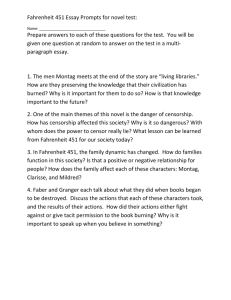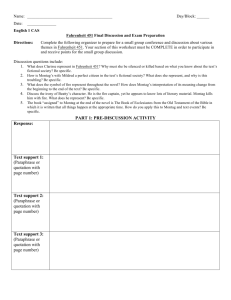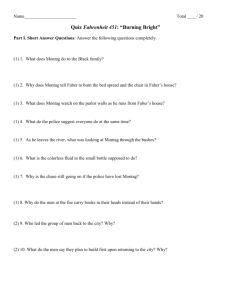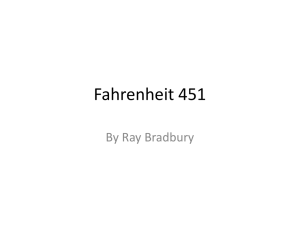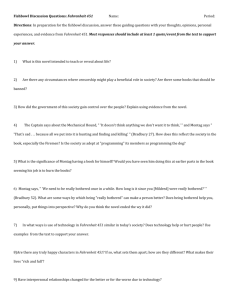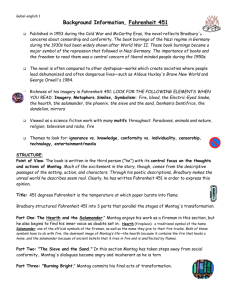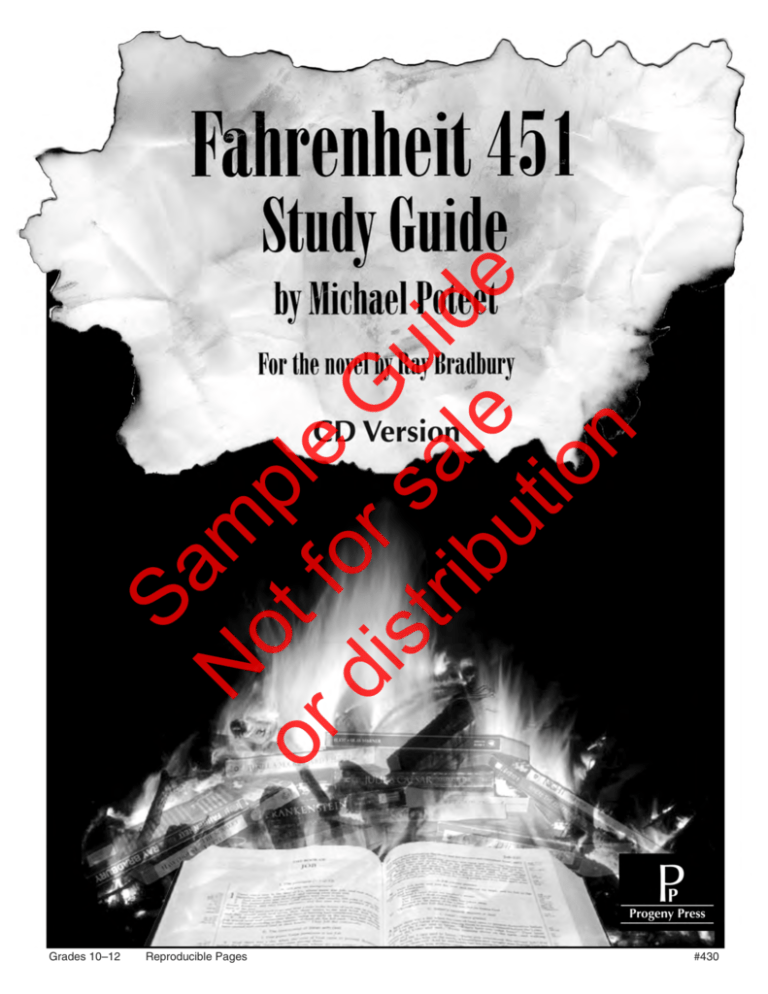
Grades 10–12
Reproducible Pages
#430
Sa
N m
o
p
or t f le
di or G
st sa ui
rib le de
ut
io
n
Sa
N m
o
p
or t f le
di or G
st sa ui
rib le de
ut
io
n
Limited permission to reproduce this study guide
Purchase of this book entitles an individual teacher
to reproduce pages for use in the classroom or home.
Multiple teachers may not reproduce pages
from the same study guide.
Sale of any printed copy from this CD is strictly and specifically prohibited.
Fahrenheit 451 Study Guide
A Progeny Press Study Guide
by Michael Poteet
edited by Michael Gilleland
cover design by Michael Gilleland
Copyright © 2005 Progeny Press
All rights reserved.
Reproduction or translation of any part of this work
beyond that permitted by Section 107 or 108 of the
1976 United States Copyright Act without the written
permission of the copyright owner is unlawful.
Requests for permission or other information should be
addressed to Reprint Permissions, Progeny Press,
P.O. Box 100, Fall Creek, WI 54742-0100.
Printed in the United States of America.
ISBN: 978-1-58609-361-7 Book
978-1-58609-219-1 CD
978-1-58609-453-9 Set
2
© 2005 Progeny Press
No copy of this study guide may be resold.
Fahrenheit 451 Study Guide
Sa
N m
o
p
or t f le
di or G
st sa ui
rib le de
ut
io
n
Table of Contents
Study Guide Author .................................................................................................3
Peer Review Panel .....................................................................................................4
Note to Instructor .....................................................................................................6
Synopsis ....................................................................................................................8
About the Novel’s Author .........................................................................................9
Background Information ........................................................................................12
Ideas for Prereading Activities .................................................................................14
Part One: “The Hearth and the Salamander” Section 1 ...........................................15
Part One: “The Hearth and the Salamander” Section 2 ...........................................29
Part Two: “The Sieve and the Sand” Section 1 ........................................................36
Part Two: “The Sieve and the Sand” Section 2 ........................................................43
Part Three: “Burning Bright” Section 1....................................................................52
Part Three: “Burning Bright” Section 2 ...................................................................58
Overview Questions ................................................................................................64
Suggested Final Essays and Projects .........................................................................69
Resource List ..........................................................................................................72
Additional Resources ..............................................................................................74
Answer Key .............................................................................................................75
© 2005 Progeny Press
No copy of this study guide may be resold.
5
Fahrenheit 451 Study Guide
Sa
N m
o
p
or t f le
di or G
st sa ui
rib le de
ut
io
n
Synopsis
Guy Montag, a fireman of the future, is responsible for starting fires, not stopping
them. In his society, books have been banned—all books, save the firemen’s own rule
books, which contain the ominous order, “Burn everything.” Montag finds pleasure in
enforcing the status quo—which is that pleasure is the ultimate good, and intellectual
pursuits are bad because they breed dissatisfaction and superiority—until one autumn
evening when a teenage neighbor, Clarisse McClellan, asks him a simple, haunting
question: “Are you happy?”
The question takes on greater urgency when Montag discovers that his wife
Mildred has overdosed on pills in a suicide attempt. After she is perfunctorily and
mechanically revived by technicians, she has no memory of her actions and resumes
her distraction-filled days as though nothing has happened. She continues to insist she
is happy, spending her time in the ironically named “living room” with her televised,
life-sized “family” entertaining her from three wall-sized screens.
The final shock to Montag’s complacency occurs when he and his fellow firemen respond to an alarm at 11 North Elm Street, where a woman possesses a contraband library. Rather than passively submit to the firemen’s kerosene, she lights the
match that ignites her books and herself. As a result of this self-immolation, Montag
clearly sees a new truth: “There must be something in books, things we can’t
imagine. . . .” And perhaps, he thinks, that something can heal not only his life and
his marriage, but also his happiness-hunting society.
And so Montag begins to read forbidden books that he has hidden in his home,
putting his career and life in danger. With the help of Faber, a former professor of literature, Montag seeks a way to help—or force—his society to remember what it has
forgotten. With Fire Captain Beatty, the firemen, and their lethal Mechanical Hound
in pursuit of him, Montag races against time to save a society unaware that it is heading toward self-destruction.
8
© 2005 Progeny Press
No copy of this study guide may be resold.
Fahrenheit 451 Study Guide
Sa
N m
o
p
or t f le
di or G
st sa ui
rib le de
ut
io
n
Part Two: “The Sieve and the Sand”
Section 2
Analysis:
1. Identify the source of these words Montag reads aloud: “That favourite subject,
Myself.” How do Montag and Mildred’s differing reactions to this quote
develop their characters?
2. Faber alludes to the myth of Hercules and Antaeus. Look up Antaeus and
Hercules. How does that story apply to the society of Fahrenheit 451? To what
extent do you think it applies to your society today?
3. In literature, a foil is an object or character who, by contrast, calls attention to
or enhances the traits and qualities of another object or character. How might
Faber and Montag be considered foils to each other in Part Two? Support your
response with specific references to the text.
© 2005 Progeny Press
No copy of this study guide may be resold.
43
Fahrenheit 451 Study Guide
Sa
N m
o
p
or t f le
di or G
st sa ui
rib le de
ut
io
n
4. Faber reads the book of Job to Montag “so [Montag] can remember.” What
does Montag want to remember, and how might Job be a text that will help
him remember it? What significance do you see in the fact that Bradbury chose
to have Faber read this biblical book in particular?
5. What does the conversation between Mildred and her friends tell us about the
society of Fahrenheit 451? Support your answer with specific references to the text.
6. Research and read in full the poem Montag reads aloud to Mildred and her
friends. Why do you think Bradbury has chosen to place this poem in Montag’s
mouth? What relevance do both it and its author have to the characters and
context of Fahrenheit 451?
Dig Deeper:
7. Near the beginning of Part Two, Mildred protests to Montag, “Why should I
read? What for?” How would you answer that question for yourself?
44
© 2005 Progeny Press
No copy of this study guide may be resold.
Fahrenheit 451 Study Guide
Sa
N m
o
p
or t f le
di or G
st sa ui
rib le de
ut
io
n
Why should Christians read the Bible? When responding, consider Nehemiah
8:1–10; Psalm 119:9–11, 105; John 20:31; Romans 15:4; and 2 Timothy
3:16–17.
8. Early in Part Two, Montag swears, using the name of Jesus and God as an
expletive. Why do you think people do this? Is swearing wrong? When someone swears, should we stop listening to that person, or if it is in a book, should
we stop reading that book? Why?
Read 1 Corinthians 5:9–13; Philippians 4:8. How do these verses say we, as
Christians, should conduct ourselves? How should we deal with un-Christ-like
behavior in non-Christians? How should we deal with it in Christians? How do
you apply this to hearing a person swear or reading a book that contains swear
words?
9. At one point, Mildred angrily asks Montag, “Who’s more important, me or
that Bible?” Read Matthew 10:34–39 and Mark 7:9–13. How might Jesus’
words bear on Mildred’s question?
© 2005 Progeny Press
No copy of this study guide may be resold.
45
Fahrenheit 451 Study Guide
Sa
N m
o
p
or t f le
di or G
st sa ui
rib le de
ut
io
n
10. In the subway, Montag tries to read as much as possible of his Bible in the
hopes that he will absorb some of its words. Identify the passage Montag is trying to read. How does this biblical passage influence your understanding of this
scene in Bradbury’s novel?
11. Reread the description of the advertising in the subway and of the crowd’s reactions to it. Compare this passage with Genesis 3:1–7. What symbolism occurs
in both texts, and how does it help Bradbury develop his theme(s)?
12. After Montag has read to Mildred all afternoon, he realizes neither he nor she
can understand what he has been reading: “Poor Millie, he thought. Poor
Montag, it’s mud to you, too. But where do you get help, where do you find a
teacher this late?” What has Montag realized he needs? What is this commonly
called in business and education? Read Acts 8:26–35. In what ways is this passage parallel to Montag’s situation?
13. Read Proverbs 1:8–9; 16:20; 1 Corinthians 4:15–16; 1 Thessalonians 1:6–7;
2 Thessalonians 3:6–9; 2 Timothy 1:13; 2:1–2; 3:14–15; Titus 2:6–8.
According to these verses, what is one way in which Christians can learn and
put into practice what we have learned? As we mature in our life and knowledge, what do these verses suggest we are to do?
46
© 2005 Progeny Press
No copy of this study guide may be resold.
Fahrenheit 451 Study Guide
14. Late in Part Two, Montag reflects on his relationship with Faber:
Sa
N m
o
p
or t f le
di or G
st sa ui
rib le de
ut
io
n
[T]he old man would go on with this talking and this talking,
drop by drop, stone by stone, flake by flake. His [Montag’s] mind
would well over at last and he would not be Montag any more,
this the old man told him, assured him, promised him. He would
be Montag-plus-Faber, fire plus water, and then, one day, after
everything had mixed and simmered and worked away in silence,
there would be neither fire nor water, but wine. . . . Even now he
could feel the start of the long journey, the leave-taking, the goingaway from the self he had been.
How is Montag’s relationship to Faber like and unlike a Christian’s relationship
to Christ through the Holy Spirit? Consider Romans 7:21–25, 2 Corinthians
2:15 and 5:17, Romans 5:5, Philippians 3:12–14, and Galatians 2:20 when
preparing your response.
15. As Montag goes to meet Faber for the first time in Part Two, he asks Mildred:
“Millie? Does the White Clown love you? . . . Does your ‘family’
love you, love you very much, love you with all their heart and
soul, Millie?
He felt her blinking slowly at the back of his neck. “Why’d
you ask a silly question like that?”
Later, when the ladies come over to watch the White Clown, Montag reads a
portion of “Dover Beach” to them:
“‘Ah, love, let us be true
To one another! for the world, which seems
To lie before us like a land of dreams,
So various, so beautiful, so new,
Hath really neither joy, nor love, nor light,
© 2005 Progeny Press
No copy of this study guide may be resold.
47
Fahrenheit 451 Study Guide
Nor certitude, nor peace, nor help for pain;
And we are here as on a darkling plain. . . .’”
Sa
N m
o
p
or t f le
di or G
st sa ui
rib le de
ut
io
n
How does the passage from “Dover Beach” illuminate and illustrate Montag’s
questions of Mildred and their experiences so far in Fahrenheit 451?
Do you think this passage from “Dover Beach” is an accurate description of the
world as we know it? Read Matthew 6:19–21; Romans 8:18–24; 1 Corinthians
13; Philippians 3:7–14; 1 John 3:16–18. How do these verses illustrate or
expand on the ideas from this portion of “Dover Beach”?
16. As Faber examines Montag’s Bible, he comments,
Lord, how they’ve changed it in our ‘parlors’ these days. Christ is
one of the ‘family’ now. I often wonder if God recognizes His own
son the way we’ve dressed him up, or is it dressed him down? He’s
a regular peppermint stick now, all sugar-crystal and saccharine
when he isn’t making veiled references to certain commercial projects that every worshiper absolutely needs.
How does Faber’s evaluation of his society compare with what you see in your
society? Do you think only “worldly society” does this to Christ, or does some
of this attitude and practice sneak into “Christian culture” also? Do you think
Jesus approves of Christian merchandising? Why? List specific examples
throughout your answer.
48
© 2005 Progeny Press
No copy of this study guide may be resold.
Fahrenheit 451 Study Guide
Sa
N m
o
p
or t f le
di or G
st sa ui
rib le de
ut
io
n
17. Faber calls himself a coward because he did not speak up on behalf of those
who were persecuted for being intellectuals: “I’m one of the innocents who
could have spoken up and out when no one would listen to the ‘guilty,’ but I
did not speak and thus became guilty myself.” Read Esther 4:6–16; Job
29:11–17; Psalm 72:1–4, 12–15; Matthew 25:41–46; and Luke 16:19–25.
What do these passages teach about opportunities and obligations to speak “up
and out,” as Faber says, on behalf of those who cannot speak for themselves?
How can you follow these teachings?
18. Faber critiques his society for being “rootless,” for giving up the rich nourishment once found (among other places) in books. The society of Fahrenheit 451
suffers from a collective amnesia. George Santayana wrote in The Life of Reason
(Vol. 1, 1905), “Those who cannot remember the past are condemned to
repeat it.” Read Deuteronomy 6:4–9; 8:10–20; Psalm 106:6–15; Jeremiah
6:16–19; John 14:25–26; Acts 2:42; 2 Peter 1:12–15; and Revelation 2:2:4–5.
What do these texts teach about the importance of memory, both personal and
corporate, in the life of faith? How do such passages as Isaiah 43:16–21 and
1 Corinthians 11:23–26 help define faithful remembering?
Optional Activities:
1. Find and support an organized effort to give Bibles to those who do not have
them, or plan a project to support Bible translation efforts. Organizations
include International Bible Society (www.ibs.org); American Bible Society
(www.americanbible.org); Wycliffe Bible Translators
(www.wycliffe.org); The Gideons International (www.gideons.org); or
research your own church’s or denomination’s resources.
© 2005 Progeny Press
No copy of this study guide may be resold.
49
Fahrenheit 451 Study Guide
Sa
N m
o
p
or t f le
di or G
st sa ui
rib le de
ut
io
n
2. The juxtaposition of the biblical text and the “Denham’s Dentifrice” commercial in the subway symbolizes a conflict of value systems. Research the amount
of advertising to which people in your country are exposed. Select a number of
radio, television, and/or Internet advertisements and analyze them critically.
What values do they convey, explicitly or implicitly, and by what methods do
they convey them? How well do these values agree with the values of Christian
faith and life? Share the results of your research with others.
3. In late 20th- and early 21st-century America, producers of goods and services
were increasingly tapping “the Christian marketplace,” releasing clothes, music,
movies, books, and more aimed at Christian consumers. To what extent is it
appropriate and right for Christians to buy specifically Christian products? Are
some Christian products more good or necessary than others? How do or ought
Christians negotiate between engaging the rest of consumer culture and remaining apart from it? Biblical texts that might inform your discussion include but
are not limited to: Matthew 5:13–16; 6:19–21; Mark 7:17–23; John 17:14–18;
1 Corinthians 6:12; 2 Corinthians 6:14–15; Revelation 18:4–8, 11–13.
4. Identify an individual or group in your community whom others ignore or
oppress, a person or persons who, for whatever reason, have been rendered
“voiceless.” Form a plan to speak “up and out” on their behalf, in the name of
Jesus Christ. Go beyond charitable works and actively articulate why you do
what you are doing for them. Avoid being condescending, always reminding
others, and yourselves, that you are “unworthy servants” of a Master who
demands justice, and you are only doing your duty (see Luke 17:10).
5. Reflect on Faber’s words when Montag first meets with him (“Mr. Montag, you
are looking at a coward . . .”) in conjunction with the well-known poem “First
They Came . . .” (the text offered here is a variant translation from the original
German, as found on the Boston, Massachusetts Holocaust Memorial):
They came first for the Communists,
and I didn’t speak up because I wasn’t a Communist.
Then they came for the Jews,
and I didn’t speak up because I wasn’t a Jew.
50
© 2005 Progeny Press
No copy of this study guide may be resold.
Fahrenheit 451 Study Guide
Sa
N m
o
p
or t f le
di or G
st sa ui
rib le de
ut
io
n
Then they came for the trade unionists,
and I didn’t speak up because I wasn’t a trade unionist.
Then they came for the Catholics,
and I didn’t speak up because I was a Protestant.
Then they came for me,
and by that time no one was left to speak up.
Think about parallels between this poem and Faber’s words. Research the life of
the poem’s author, the Rev. Martin Niemöller. What led him to write these
words? Share the results of your research and your personal reflection and meditation with others in written, verbal, or multi-media form.
© 2005 Progeny Press
No copy of this study guide may be resold.
51
Fahrenheit 451 Study Guide
Sa
N m
o
p
or t f le
di or G
st sa ui
rib le de
ut
io
n
18. Scripture consistently exhorts God’s people to remember God and God’s grace toward them. The law given to Moses
warns against the consequences of forgetting God (Deut. 8) and presents practical ways in which the people can both
remember their identity and communicate it to future generations (Deut. 6).When the people forget God, to whom
they belong, disaster follows (Psalm 106; Jeremiah 6); when they remember, they can receive and experience salvation
(Revelation 2). The Holy Spirit helps us remember Jesus’ teachings (John 14), as do our spiritual leaders (2 Peter 1), and
Christians follow the discipline of reading and reflecting on the Scriptures together (Acts 2:42). Faithful remembering,
however, “extends far beyond nostalgic recall . . . reverence for the past is merged with relevance in the present,” as 1
Corinthians 11’s description of the Lord’s Supper demonstrates. [Ryken, et al., 702–03] The Greek word anamnesis (vv.
24, 25), in fact, carries overtones of bringing what is remembered from the past into the present. Faithful memory is
ultimately oriented to the future, so that, through Isaiah, God can go so far as to say, “Forget the former things . . .”
(43:18). God’s people are not to remember the past for its own sake, but to gain from it nourishment for the present and
sustaining hope for the future.
Part Three: “Burning Bright” Section 1
Vocabulary:
1. aesthetic; 2. luminous, limned, smouldering; 3. pedants, prattle, incessantly; 4. dilate; 5. squanders; 6. scythe, convolutions; 7. valise; 8. litterateur
Elements of Literature:
Symbolism:
1. Interpretations may vary; accept reasonable responses supported by specific reference to the text. Generally speaking,
Bradbury invests fire in Part Three, and throughout the book, with two opposite meanings: the power to create and the
power to destroy. Fire holds these contradictory meanings together in a single image. For example, when Montag burns
his house as Part Three begins, he is destroying: he literally burns his house, but, symbolically, he burns his old life as
well (all evidence of his relationship with Mildred; Captain Beatty). As Part Three ends, however, readers see fire as the
power to create: the ragtag group of “rememberers” gathers around a fire that “was not burning” but “was warming.” The
fire here symbolizes the light of knowledge these men hope to bring to their world.
2. Interpretations may vary. The war’s symbolic significance could be assessed from several angles, one of which is the
fact that it breaks out shortly after the residents of the city have been absorbed in watching the Mechanical Hound’s pursuit of Montag; as Granger says, “And the war’s begun . . . and the city is there, all wrapped up in its own coat of a thousand colors”—in this context, the allusion may be to dreaming, not as a means of divine revelation (as in Joseph’s story
in Genesis) but in dreaming as the opposite of reality, or it may be to a perceived “favored son” status in which
Americans believe they are more deserving than the rest of the world. As we have repeatedly seen, the culture of the
novel is based on dreams, illusion, and fantasy. The war is a sudden intrusion from the outside, even though it has been
building throughout the novel. We do not know the causes for it, but that narrative choice is significant, because neither
do the characters in the novel. The war, then, could symbolize judgment on the novel’s society; indeed, in Part Three,
the narrator suggests it be assigned this meaning: “Montag saw the flirt of a great metal fist over the far city, and he knew
the scream of the jets that would follow, and say, after the deed, disintegrate, leave no stone on another, perish. Die.” The
text alludes to Jesus’ prediction of the fate of Jerusalem in A.D. 70 (Matt. 24:2 and parallels). This meaning of the war
has been hinted at earlier in the book—for example, when Montag asks Mildred if their society’s self-absorbed isolation
and the rest of the world’s resentment lies behind the fact of “two atomic wars since 1990”—but, in Part Three and its
vivid image of judgment on the city, that meaning becomes explicit.
3. Answers will vary because symbolism is in the eye of the beholder. Use the following as patterns for comparison.
Montag’s house: Literal Function: place in which he lived, now being destroyed, burned, because he kept books; Symbolic
Function: Montag is burning his old life. He seems almost to take pleasure in burning the beds and and the parlor walls
in particular. He seems ready to turn his back on, destroy, all he once was. River: Literal Function: Montag jumps into
the river to escape the Mechanical Hound. Symbolic Function: Might be considered a symbolic death or baptism. When
he goes in, he is Montag, but while in the river he changes clothes—“drowns” his old clothes, the “old man.” He leaves
the old technological, city Montag behind and rises out of the river into the pastoral (idyllic rural) life. He also goes in a
man with a history and ability to function in his society, and emerges almost helpless and innocent. Railroad: Literal
Function: Gives Montag a path to follow to find the men he has heard of. Symbolic Function: The railroad was once a
lifeblood of transportation and commerce between cities and between the rural and urban. Montag follows this track
86
© 2005 Progeny Press
No copy of this study guide may be resold.

